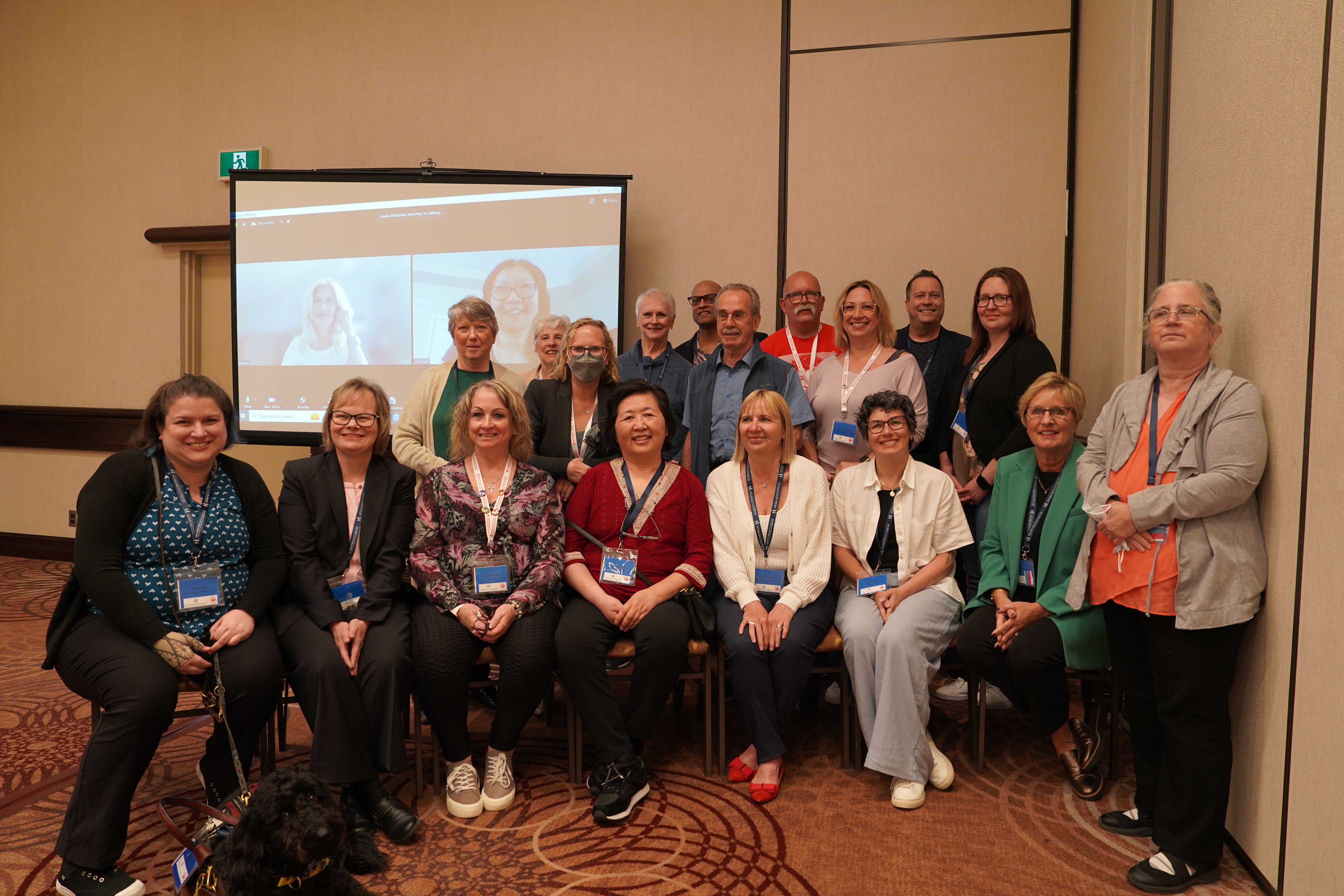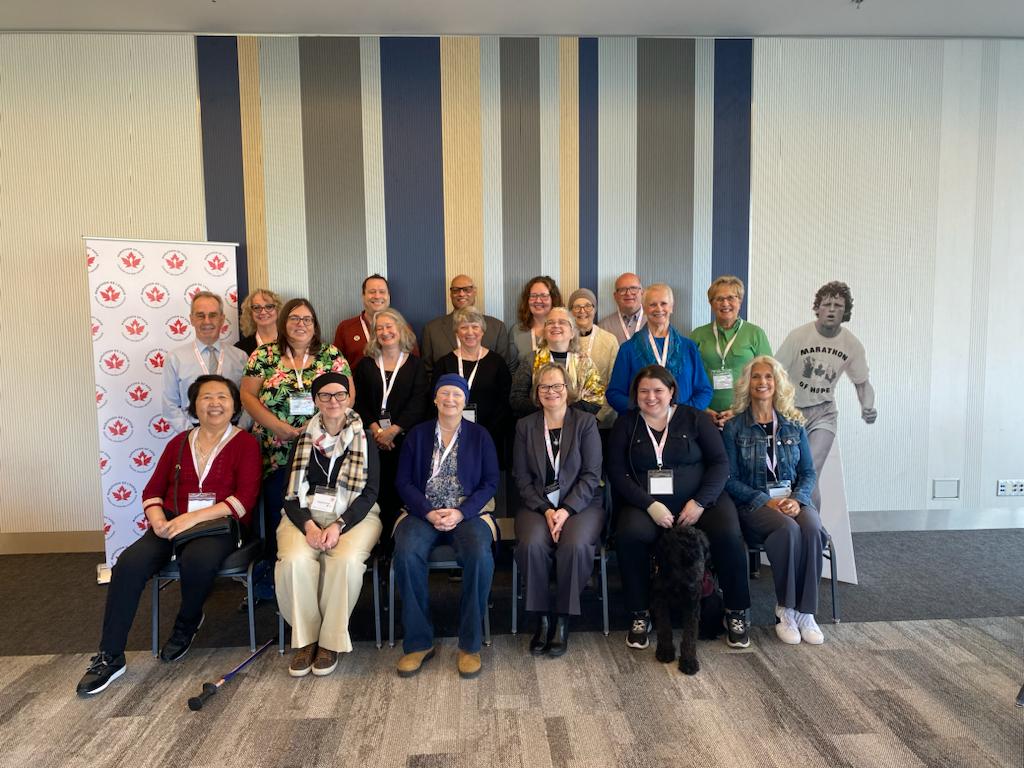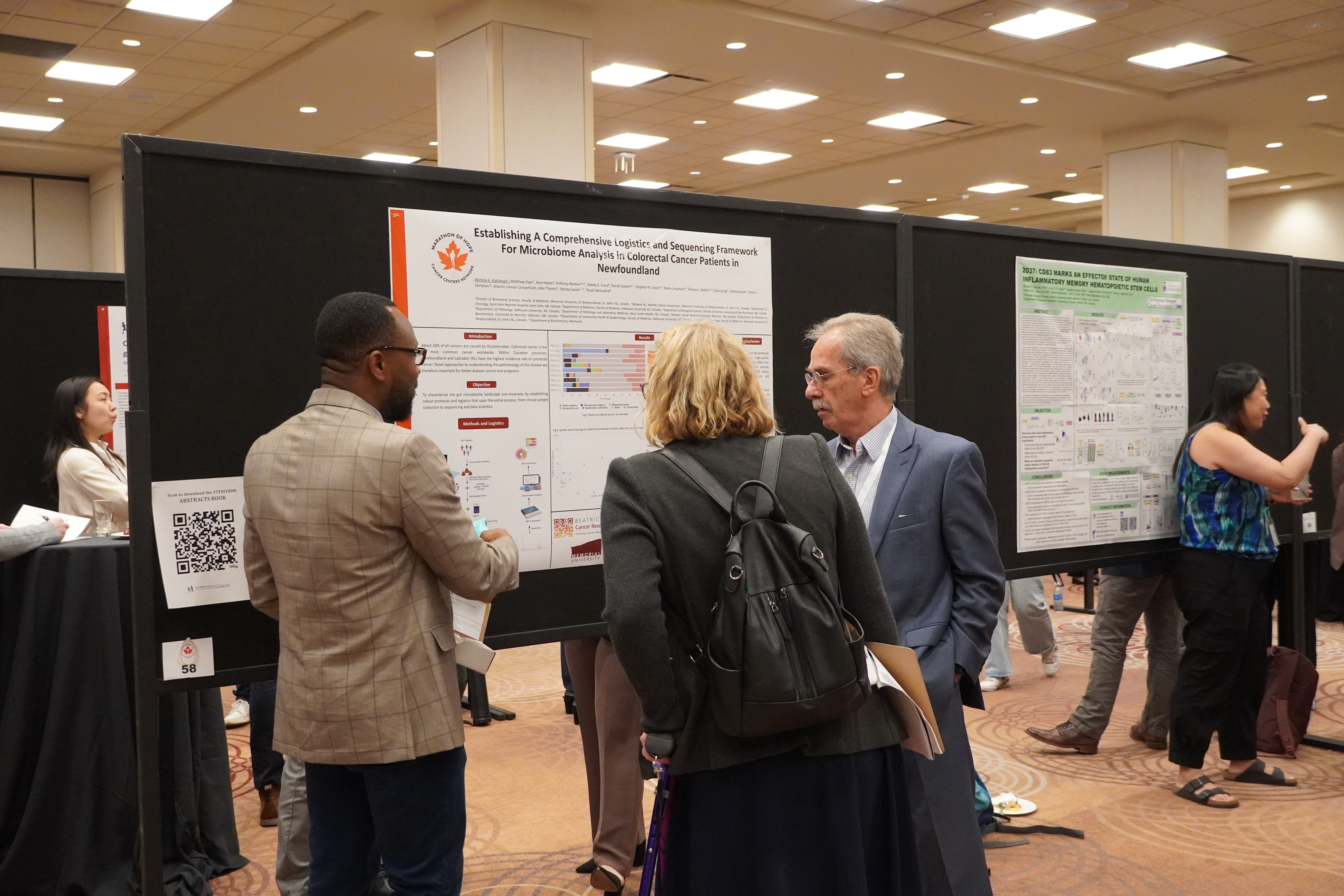Press releases
- NATIONAL PRESS RELEASE (EN): New Terry Fox research program developed BY cancer patients FOR cancer patients – the first in Canada – supports ten teams addressing gaps and disparities in care, access, treatment
- NATIONAL PRESS RELEASE (FR): Un nouveau programme de recherche de Terry Fox élaboré PAR des personnes atteintes d’un cancer POUR les patients vivant avec le cancer – une première au Canada – vient offrir un soutien à dix équipes qui se penchent sur les écarts et les inégalités dans les soins, les traitements et l’accès
- NETWORK VOICES: How a new program designed by patients, survivors and caregivers is paving the way for patient-centric research (Opinion piece written by members of the Patient Working Group)
Media assets
Photos
 Members of the Patient Working Group met in Toronto in May 2024 to discuss the themes of this research program.
Members of the Patient Working Group met in Toronto in May 2024 to discuss the themes of this research program.
 Patient Working Group Members during the Learning Exchange Event held in Halifax in Nov. 2023.
Patient Working Group Members during the Learning Exchange Event held in Halifax in Nov. 2023.

FUNDED PROJECTS
- Patient Reported Outcomes of People Experiencing Lung Cancer (PROPEL); Team lead: Dr. Vishal Navani (University of Calgary); Award value: $250,000
- Co-designing an intervention to support people living with and beyond a metastatic cancer diagnosis; Team lead: Dr. Robin Urquhart (Dalhousie University); Award value: $115,000
- PAtient-driven Cancer Trials (PACT): The development of a patient-centred clinical trial design framework for precision oncology; Team lead: Dr. Samantha Pollard (Simon Fraser University); Award value: $239,000
- Exploring the perspectives of stakeholders for homologous recombination deficient (HRD) biomarker testing to guide precision medicine for advanced ovarian cancer treatment; Team lead: Dr. Helen McTaggart (BC Cancer) Cowan; Award value: $183,500
- Physical activity as a novel management approach in Myeloproliferative Neoplasms: the MPN-FIT Study; Team lead: Dr. Natasha Szuber (Maisonneuve Rosemont Hospital Research Center (CR-HMR)); Award value: $225,500
- Patient-focused evAluatioN Of dispaRities AMong pArticipants enrolled onto Precision Oncology studies; Team lead: Dr. Abdulazeez Salawu (Princess Margaret Cancer Centre / University Health Network); Award value: $151,500
- Disparities in access to precision oncology drugs across Canada; Team lead: Dr. Bishal Gyawali (Queen’s University); Award value: $180,000
- The challenge to offer a second hematopoietic stem cell transplantation to children and young adults with relapsed hematological malignancies: Using a qualitative approach to explore health care professional, parental and patient decision-making variables; Team lead: Dr. Joerg Krueger (The Hospital for Sick Children); Award value: $50,000
- Setting up a personalized learning path for patients with neuroendocrine tumours; Team lead: Dr. Marie-Pascale Pomey (Centre Hospitalier de l’Université de Montréal (CHUM); Award value: $200,000
- Towards Equity in Precision Oncology: Co-designing Interventions to Address Disparities Team lead: Dr. Yvonne Bombard (Unity Health Toronto); Award value: $200,000
Frequently Asked Questions about the Marathon of Hope Cancer Centres Network and Precision Oncology
What is the Marathon of Hope Cancer Centres Network?
The Marathon of Hope Cancer Centres Network (also known as the MOHCCN or “the Network”) is a national initiative led by the Terry Fox Research Institute and the Terry Fox Foundation. It is funded by the federal government and partner institutions across the country. Inspired by Terry Fox, the Network’s main goal is to unite cancer researchers, clinicians, patients, and administrators from over 30 institutions across Canada under a single vision: to improve outcomes and quality of life of cancer patients by accelerating the implementation of precision medicine for cancer.
Watch
What is precision medicine for cancer?
Just as everyone’s DNA is unique, each person’s cancer also has a distinct molecular profile. For example, two breast cancers that look similar under a microscope can be driven by different mutations, making them respond differently to treatment.
Today, cancers are most often treated according to their type and location, whereas precision medicine for cancer (also known as precision oncology) is based on the idea that an individual patient’s treatment can be guided by their unique characteristics, including their tumour’s individual molecular signature. For example, patients whose tumour cells carry a mutation in a specific gene may receive a drug that acts against that mutation, instead of a “one-size-fits-all" chemotherapy. This helps personalize treatments, so that each patient receives the right drug at the right dose at the right time.
- Learn more about precision medicine for cancer by clicking here.
Watch
How can precision medicine improve the lives of cancer patients?
Precision oncology aims to identify which treatment is most likely to work – or not work – against a patient’s specific cancer. This targeted, personalized approach aims to improve survival and quality of life of patients by improving the chances of a successful treatment, reducing uncertainty and diminishing the impact that unsuccessful treatments can have on a patient’s physical and emotional well-being.
Understanding the mutations that drive cancer in each patient can also help devise new tests and screening protocols to diagnose and detect cancers earlier, when they may be more treatable. In this way, precision oncology can help intercept cancers at an earlier stage, when treatments are often more effective and less disruptive to patients’ quality of life, leading to improved care experiences and overall survival.
Is precision medicine for everyone?
While precision medicine holds great potential, it is still in its early days. In fact, today, it only helps a small percentage of cancer patients.
There are many reasons why this is the case. For one, we still have a lot to learn about the biology of cancer and how specific mutations affect different aspects of a cancer’s growth, its ability to evade detection from the immune system and its resistance to current therapies. We also need to better understand how each person’s individual context shapes their response to specific treatments.
To act on this knowledge, we also need to have safe and effective drugs that target the individual characteristics of each patient and their tumour. These targeted drugs exist for some cancers, but there is still a lot of work to be done to make more of these kinds of drugs available to more people.
Since precision oncology is currently applied inconsistently and in a small proportion of patients, it is difficult to study. There is much to learn about the context in which it is most effective and how it can be best applied in a way that responds to what patients want. These and many other questions about precision medicine need to be answered for more people to benefit from this promising type of cancer care.
How is the Marathon of Hope Cancer Centres Network accelerating precision medicine for cancer in Canada?
To make precision medicine a reality for more Canadians, we need everyone involved in cancer research and care to work together. This is why the Marathon of Hope Cancer Centres Network has created the Team Canada of Cancer Research. This constantly growing group is made up of patients, researchers, oncologists, administrators and donors from across the country who are sharing data, knowledge and resources like never before to benefit all Canadian cancer patients, regardless of where they are in the country.
This unified approach is instrumental in part because answering all the remaining questions about precision medicine requires a tremendous amount of data. On their own, individual organizations simply wouldn’t have enough data needed for such intensive research. This is where the Marathon of Hope Cancer Centres Network comes in, promoting a team approach that leverages the strengths of its partner institutions and members. In the first phase of the Network, we are building the country’s largest and most complete cancer research dataset, the MOHCCN Gold Cohort. This resource will allow researchers to study how and why real-world cancer patients respond to specific drugs, and its creation is helping to build the expertise and infrastructure needed to gather, share and analyze clinical and genomic data in ways that will benefit cancer patients now and into the future.
Beyond the creation of this game-changing data generation and sharing infrastructure, the Network is building the capacity and collaborative networks needed across Canada to study and implement precision oncology at scale. This ambitious goal requires an unprecedented amount of teamwork and large investments in both people and systems, both of which are being catalyzed through the Network.
Introducing the Patient Working Group: Who we are.
The MOHCCN Patient Working Group is made up of 30 individuals from 9 provinces who are cancer patients, survivors, family members and caregivers.
Together with other members of the Team Canada of Cancer Research, we are working to ensure that all Network activities are helping to advance precision medicine in ways that are aligned with the values and desires of cancer patients.


